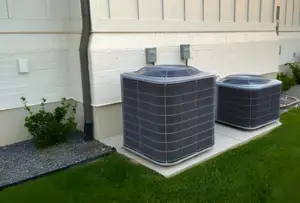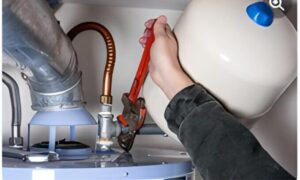Air conditioning systems are a common feature in many homes and offices, providing relief from the sweltering heat and humidity outside. However, beneath their cool and comforting facade, these systems may conceal hidden dangers that pose a threat to our health and well-being.
The risks associated with air conditioning systems range from the proliferation of mold spores and allergens to the rapid spread of bacteria and viruses. Moreover, improper system design and maintenance can lead to poor air quality and damage to valuable items.
In this article, we will explore these hidden dangers and discuss practical solutions to mitigate them, ensuring a healthier and more comfortable indoor environment for all.
High Humidity and Air Quality
High humidity can have significant impacts on air quality, health, and comfort. One consequence is the proliferation of mold spores, dust mites, and allergens, which thrive in humid environments. Additionally, high humidity increases the levels of noxious chemicals in the air, posing a risk to respiratory health. Bacteria and viruses also multiply and spread more easily in high humidity, increasing the risk of illness. Moreover, headaches and allergy symptoms can worsen in humid conditions.
Apart from health effects, high humidity can cause damage to furniture, paintings, floors, and woodwork. Therefore, it is crucial to address high humidity levels to maintain good air quality, health, and comfort.
Low Humidity and Health Effects
Low humidity, on the other hand, can have detrimental effects on our health and well-being, exacerbating symptoms of dry skin, dry eyes, and static shocks, particularly for individuals with asthma and breathing difficulties. Here are three ways in which low humidity can impact our health:
- Dry skin: Low humidity can cause the skin to lose moisture, leading to dryness, itching, and irritation. This can be especially problematic for individuals with pre-existing skin conditions like eczema.
- Dry eyes: In environments with low humidity, the eyes can become dry and irritated. This can result in discomfort, redness, and a higher risk of eye infections.
- Static shocks: Low humidity increases the build-up of static electricity, leading to frequent static shocks. This can be not only uncomfortable but also potentially dangerous, particularly for individuals with pacemakers or other electronic devices.
Solutions for Humidity and AC Problems
To address humidity and air conditioning problems, it is essential to implement effective solutions that optimize air quality and ensure optimal functioning of HVAC systems.
One crucial step is to ensure that the air conditioner is properly sized for the space, as this will enable it to effectively remove humidity.
Additionally, updating the system design can help to optimize air quality and comfort levels. In areas with high humidity, installing dehumidifiers in damp areas can be beneficial, while central humidification systems can be installed in spaces with low humidity.
Regular maintenance of ventilation, heating, and air conditioning systems is crucial to prevent issues. Inspections and preventative maintenance agreements with experts can help keep the systems in good working order.
Importance of Air Quality for Functioning
Indoor air quality plays a crucial role in the functioning of HVAC systems, directly impacting the comfort, health, and overall well-being of occupants.
Proper air quality ensures a comfortable and pleasant environment, allowing individuals to focus and perform tasks efficiently.
Good air quality reduces the risk of respiratory issues, allergies, and other health problems, promoting a healthier living or working space.
Maintaining high air quality can prevent the spread of airborne pathogens and contaminants, protecting occupants from potential illnesses.
To ensure optimal air quality, it is essential to regularly clean, service, and maintain HVAC systems.
Properly designed and sized air conditioners, along with humidity control devices such as dehumidifiers and central humidification systems, can significantly enhance air quality.
Yearly maintenance agreements with experts help prevent air quality issues and ensure the efficient functioning of HVAC systems.
Benefits of Proper HVAC Systems
Properly designed and maintained HVAC systems offer numerous benefits in terms of improved air quality, enhanced comfort, and optimal functioning. These systems are crucial in removing humidity, providing consistent cooling, and controlling air quality. Correctly sized air conditioners effectively remove excess moisture from the air, preventing the growth of mold, dust mites, and allergens.
System design adjustments can greatly improve air quality and comfort levels, ensuring a healthier and more comfortable indoor environment. Additionally, the use of humidity control devices such as dehumidifiers and central humidification systems can further enhance air quality by addressing both high and low humidity levels.
Regular maintenance and inspections of HVAC systems are essential in preventing air conditioning and humidity-related issues, ensuring the system operates efficiently and effectively.
Regular Maintenance for Air Quality and Efficiency
Regular maintenance is essential for ensuring optimal air quality and efficiency in HVAC systems. Neglecting regular maintenance can lead to a variety of problems, including decreased air quality, reduced efficiency, and increased energy consumption. To maintain air quality and efficiency, it is important to follow these steps:
- Schedule regular inspections and servicing: Regular inspections and servicing by trained professionals can help identify and address potential issues before they become major problems. This includes cleaning or replacing filters, checking and cleaning coils, and ensuring proper airflow.
- Clean and maintain ventilation systems: Properly cleaning and maintaining ventilation systems can help prevent the buildup of dust, dirt, and other contaminants that can negatively impact air quality. This includes cleaning ductwork, vents, and registers regularly.
- Check and calibrate thermostats and controls: Accurate thermostat settings and properly calibrated controls are essential for maintaining optimal comfort and energy efficiency. Regularly checking and calibrating these components can help ensure that the system is operating at peak performance.
Frequently Asked Questions
How Can High Humidity Impact the Health of Individuals With Asthma and Breathing Difficulties?
High humidity can worsen symptoms for individuals with asthma and breathing difficulties. It can promote the growth of mold, dust mites, and allergens, and increase the spread of bacteria and viruses, leading to respiratory issues and exacerbating existing conditions.
Is It Possible for Low Humidity to Cause Damage to Valuable Items Like Furniture and Artwork?
Yes, low humidity can cause damage to valuable items like furniture and artwork. Dry air can lead to cracking, warping, and deterioration of materials. Maintaining proper humidity levels is important for preserving the integrity of these items.
What Are Some Signs That Indicate the Air Conditioning System Is Not Properly Sized for the Space?
Some signs that indicate the air conditioning system is not properly sized for the space include inadequate cooling or heating, frequent cycling on and off, and difficulty maintaining a consistent temperature throughout the space.
Are There Any Long-Term Health Effects Associated With Poor Indoor Air Quality Due to High Humidity?
Long-term health effects associated with poor indoor air quality due to high humidity include increased risk of respiratory problems, allergies, and asthma. Mold, dust mites, and bacteria thrive in high humidity, exacerbating these issues. Proper HVAC maintenance and humidity control are essential for healthy indoor air.
Can Regular Maintenance of HVAC Systems Help Prevent the Spread of Bacteria and Viruses?
Regular maintenance of HVAC systems can help prevent the spread of bacteria and viruses. Proper cleaning, servicing, and maintenance ensure optimal system performance, reducing the risk of airborne pathogens and promoting healthier indoor air quality.
Conclusion
In conclusion, it is crucial to be aware of the potential risks associated with air conditioning systems and take necessary measures to mitigate them.
High humidity can lead to the growth of mold and the spread of bacteria and viruses, while low humidity can have adverse effects on our health.
Proper system design, regular maintenance, and the use of devices such as dehumidifiers or central humidification systems are essential in creating a healthier and more comfortable indoor environment.
Additionally, maintaining good air quality is vital for the efficient functioning of air conditioning systems.








